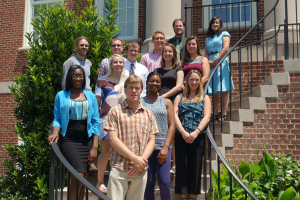Math-Biology REU
2016 Projects
 Summer 2016 Participants
Summer 2016 Participants
- UNC Chapel Hill
- University of North Carolina at Greensboro
- University of Portland
- Wake Forest University
- Wentworth Institute of Technology
- Western Carolina University
- Western State Colorado University
- Winston Salem State University
Disease Transmission in Honey Bee Colonies
Honey bee populations are declining and diseases play a central part in the sustained honey bee health declines. Importantly, viruses are vectored by parasitic mites. Natural defenses of honey bee against their diseases include an adaptive colony demography and specific behaviors. Using experimental and modeling approaches, this project will address the impact of these features on disease transmission and dynamics in honey bee hives, as a more general model for understanding infectious diseases in complex societies.
Vaccination Game Theory
As witnessed by the recent outbreak of measles, there is a gap between interest of the individuals and the interest of the population as a whole. From the individuals’ perspective, the benefits of vaccination (i.e. not getting the disease) may not be high enough to outweigh the cost of the vaccination (i.e. potential vaccine side effects) especially when majority of the population is vaccinated that the disease outbreak seems highly unlikely. Such scenarios are successfully modeled by game theory. During the Summer 2016, our team will work on developing game theoretical models for spatially structured populations.
Territorial Raider Games
Many animals are territorial and a lot of animal interactions revolve around the territories, the protection of its own territory against an aggression of a neighbor, or an aggressive invasion into neighbor�s territory. Especially for highly heterogeneous population structure, finding optimal behavior (to protect or to raid) is analytically impossible and we will adopt several machine learning techniques to help us to gain an insight into how the population structure influences the optimal behavior.
Evolution of Cooperation
In a biological context, the evolution of cooperation can be conceived as a contest between populations who exhibit alternate organizing principles that control the fitness performance of their respective individuals. These differences influence not only the local dynamics of interact groups but also their spatial distribution within a regional community. During the 2016 summer, we will continue to develop a population dynamics model formulated in the previous years of our program and consider alternate mechanisms by which cooperation could be introduced and reinforced, including mutation, step-wise transition states, and behavioral switching.
Weighted Hard Threshold Signal Approximation for Robust Change Point Detection with Application to Copy Number Variation Detection
Copy number variation (CNV) detection becomes an important issue in cancer research since CNVs can confer risk to complex disease. However, most CNVs data are noisy and outliers and human errors are often involved during or after the normalization process. In this project, we propose a Weighted Hard Threshold Signal Approximation (WHATSA) method for robust detection of copy number variation change points. There are two important contributions from this project: 1) improve the robustness and efficiency of the true DNA copy number signals recovery from existing methods and 2) develop a unique approach for simultaneous outlier detection with the signal approximation. The project will involve: a) CNV microarray data collection b) formularization of WHATSA method for signal approximation b) large amount of simulations by comparing WHATSA method with selective existing methods d) preparation of an efficient algorithm for WHATSA and public available R program.





